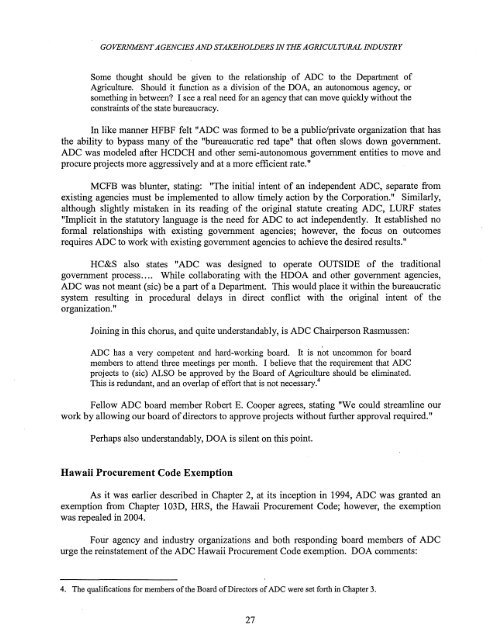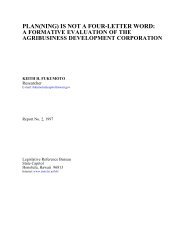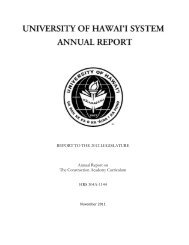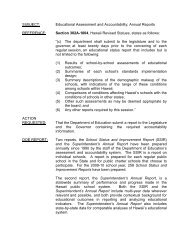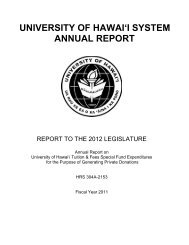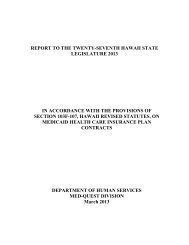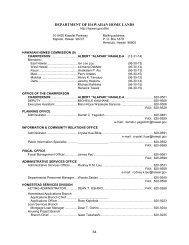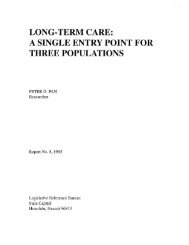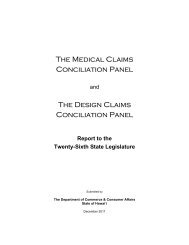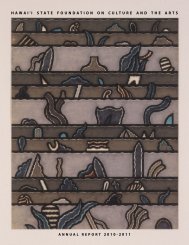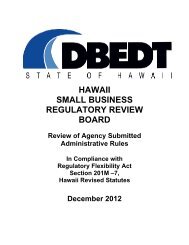agribusiness development corporation: revisited - Legislative ...
agribusiness development corporation: revisited - Legislative ...
agribusiness development corporation: revisited - Legislative ...
Create successful ePaper yourself
Turn your PDF publications into a flip-book with our unique Google optimized e-Paper software.
GOVERNMENT AGENCIES AND STAKEHOLDERS IN THE AGRICULTURAL INDUSTRY<br />
Some thought should be given to the relationship of ADC to the Department of<br />
Agriculture. Should it function as a division of the DOA, an autonomous agency, or<br />
something in between? I see a real need for an agency that can move quickly without the<br />
constraints of the state bureaucracy.<br />
In like manner HFBF felt "ADC was formed to be a public/private organization that has<br />
the ability to bypass many of the "bureaucratic red tape" that often slows down government.<br />
ADC was modeled after HCDCH and other semi-autonomous government entities to move and<br />
procure projects more aggressively and at a more efficient rate."<br />
MCFB was blunter, stating: "The initial intent of an independent ADC, separate from<br />
existing agencies must be implemented to allow timely action by the Corporation." Similarly,<br />
although slightly mistaken in its reading of the original statute creating ADC, LURF states<br />
"Implicit in the statutory language is the need for ADC to act independently. It established no<br />
formal relationships with existing government agencies; however, the focus on outcomes<br />
requires ADC to work with existing government agencies to achieve the desired results."<br />
HC&S also states "ADC was designed to operate OUTSIDE of the traditional<br />
government process.... While collaborating with the HDOA and other government agencies,<br />
ADC was not meant (sic) be a part of a Department. This would place it within the bureaucratic<br />
system resulting in procedural delays in direct conflict with the original intent of the<br />
organization. "<br />
Joining in this chorus, and quite understandably, is ADC Chairperson Rasmussen:<br />
ADC has a very competent and hard-working board. It is not uncommon for board<br />
members to attend three meetings per month. I believe that the requirement that ADC<br />
projects to (sic) ALSO be approved by the Board of Agriculture should be eliminated.<br />
This is redundant, and an overlap of effort that is not necessary.4<br />
Fellow ADC board member Robert E. Cooper agrees, stating "We could streamline our<br />
work by allowing our board of directors to approve projects without further approval required."<br />
Perhaps also understandably, DOA is silent on this point.<br />
Hawaii Procurement Code Exemption<br />
As it was earlier described in Chapter 2, at its inception in 1994, ADC was granted an<br />
exemption from Chapter 103D, HRS, the Hawaii Procurement Code; however, the exemption<br />
was repealed in 2004.<br />
Four agency and industry organizations and both responding board members of ADC<br />
urge the reinstatement of the ADC Hawaii Procurement Code exemption. DOA comments:<br />
4. The qualifications for members of the Board of Directors of ADC were set forth in Chapter 3.<br />
27


